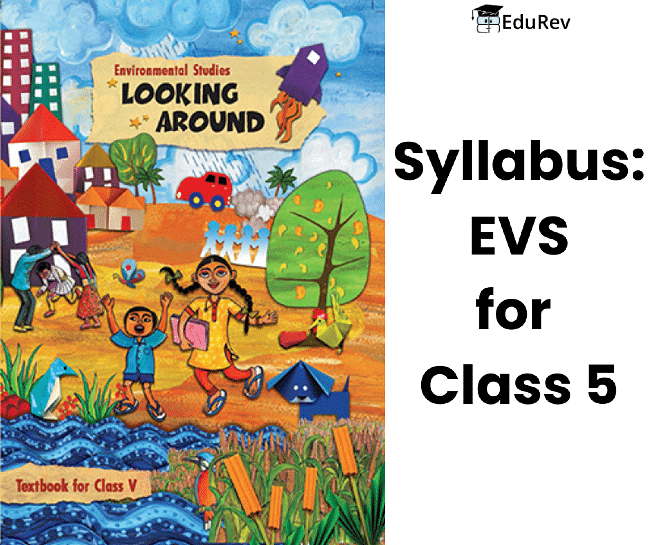Syllabus: EVS for Class 5 | EVS Class 5 PDF Download
The Class 5 CBSE EVS syllabus aims to impart a foundational understanding of the environment's importance and the impact of human actions. By addressing issues like global warming, it encourages students to make informed decisions, fostering a sense of responsibility for a balanced ecosystem. The curriculum emphasizes the consequences of individual actions on society, culture, and the environment, promoting early awareness of sustainability.

Class 5 EVS Syllabus
Chapter 1: Super Senses- Introduction to the five human senses.
- Detailed discussion on touch, smell, sight, hearing, and taste.
- Understanding the working of sensory organs.
Chapter 2: A Snake Charmer’s Story
- Exploration of creatures, including snakes.
- Insight into the significance of snakes in Indian mythology.
- Overview of the role of snake charmers.
Chapter 3: From Tasting to Digesting
- In-depth study of the human digestive system.
- Emphasis on the importance of the "gut" as the second brain.
- Comprehensive understanding of the digestive process.
Chapter 4: Mangoes Round the Year
- Focus on the life cycle and cultivation of mangoes.
- Learning about preserving and preventing mangoes.
- Overview of various types of mangoes in India.
Chapter 5: Seeds and Seeds
- Understanding the origin of trees and plants through seeds.
- Exploration of seed germination and dispersion.
- Significance of seeds in the growth of fruits, plants, and trees.
Chapter 6: Every Drop Counts
- Importance of water conservation.
- Awareness of the scarcity of fresh water sources.
- Practical ways to preserve and value water resources.
Chapter 7: Experiments with Water
- Exploration of concepts related to water properties.
- Hands-on experiments to understand sinking, floating, and dissolution.
- Application of practical knowledge to enhance understanding.
Chapter 8: A Treat for Mosquitoes
- Knowledge about diseases caused by mosquitoes.
- Prevention methods for mosquito-borne diseases.
- Understanding the control of mosquito breeding.
Chapter 9: Up You Go!
- Exploration of Indian mountains and their locations.
- Anecdotes from a camp arranged by the Nehru Institute of Mountaineering.
- Learning about leadership qualities in mountain camps.
Chapter 10: Walls Tell Stories
- Introduction to famous forts in India.
- Exploration of historical significance through forts.
- Coverage of forts like Jaisalmer, Agra, and Golconda.
Chapter 11: Sunita in Space
- Discussion on space, stars, planets, and celestial bodies.
- Insight into the shape of the Earth.
- Overview of the moon and other elements of space.
Chapter 12: What if it Finishes…?
- Concerns about the depletion of fossil fuels.
- Exploration of life without petrol and diesel.
- Discussion on consequences if fossil fuels are exhausted.
Chapter 13: A Shelter so High!
- Learning about roadways, infrastructure, and road transport.
- Understanding the construction of roads in higher altitudes.
- Insight into the importance of road transport.
Chapter 14: When the Earth Shook!
- Exploration of earthquakes.
- Understanding the reasons, processes, and effects of earthquakes.
Chapter 15: Blow Hot, Blow Cold
- Understanding the science behind temperature regulation with air.
- Practical facts about making hot things colder and vice versa.
Chapter 16: Who will do this Work?
- Learning the value of cleanliness.
- Understanding individual responsibility in maintaining cleanliness.
Chapter 17: Across the Wall
- Discussion on gender discrimination.
- Insight into India's efforts to reduce gender discrimination.
Chapter 18: No Place for Us?
- Exploration of immigration.
- Understanding reasons behind immigration and associated difficulties.
Chapter 19: A Seed tells a Farmer’s Story
- Insight into the hard work of farmers.
- Information on crop cycles, vegetables, cereals, and fruits.
Chapter 20: Whose Forests?
- Exploration of forest-related topics including conservation and habitat.
- Understanding the importance of forests.
Chapter 21: Like Father, Like Daughter
- Discussion on Mendel’s Law of Inheritance.
- Exploration of the concept of inheritance.
Chapter 22: On the Move Again
- Exploration of reasons why farmers migrate.
- Understanding the challenges faced by farmers leading to migration.
You can also access:
Hope that this document has provided you with a clear understanding of the Class 5 syllabus, enabling you to concentrate on the outlined topics and achieve excellent grades. Additionally, you have the opportunity to explore further courses for Class 5 through this link, enhancing your knowledge across various subjects.
Best of luck with your studies, and may you excel in all your academic endeavors!
|
37 videos|244 docs|41 tests
|
FAQs on Syllabus: EVS for Class 5 - EVS Class 5
| 1. What is EVS and why is it important for Class 5 students? |  |
| 2. What topics are covered in the EVS syllabus for Class 5? |  |
| 3. How can Class 5 students prepare for their EVS exam effectively? |  |
| 4. Are there any practical activities or experiments included in the EVS syllabus for Class 5? |  |
| 5. How can parents support their Class 5 child in learning EVS? |  |






















